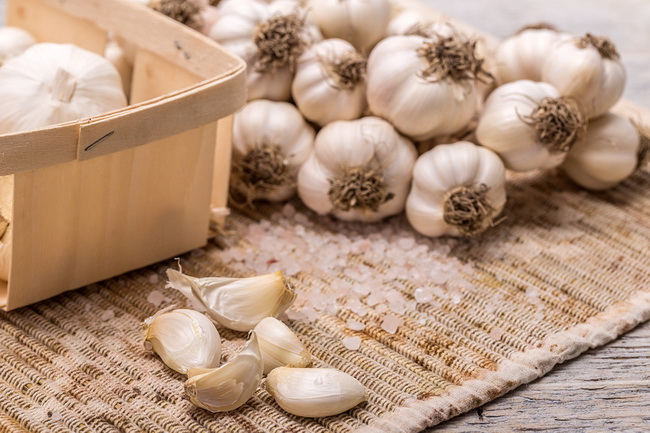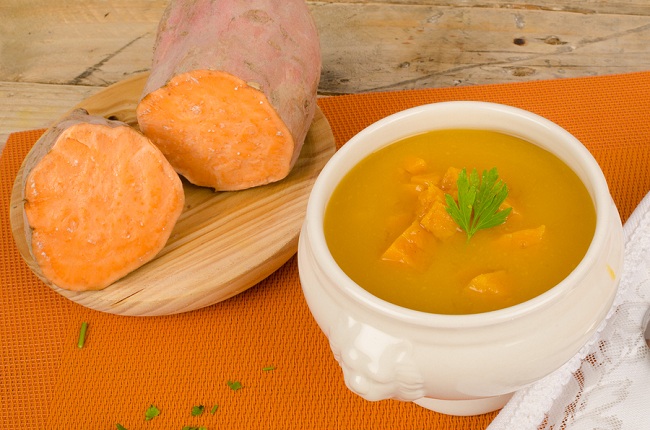- Make It Yourself Lavender Heart-Shaped Bath Bombs!
- 20 Things You Never Knew About “Down There”
- 12 Best Foods For Those Suffering From Arthritis Pain
- 12 Personal Hygiene Mistakes Almost Everyone Makes (Mom Never Told You About #4!)
- 15 Medicinal Plants And Herbs From The Cherokee People
- 12 Mind-Blowing Benefits Of Drinking Coconut Water During Pregnancy
- 12 Outstanding Winter Foods That Won’t Fatten You Up Like A Christmas Turkey
12 Top Foods That Boost the Immune System (#4 is Wicked Cool!)

Photo credit: bigstock.com
If you want to avoid that summer cold going around or you want to pump up your protection for the coming flu season, in addition to practicing good hygiene, making changes to your diet to improve your immune system is a great way to start.
What you eat plays a huge part in strengthening your immune system. Most people do not eat nearly enough fresh vegetables, fruits, nuts and seeds to stay healthy. Have you ever seen someone at the office, who usually drinks coffee or energy drinks, suddenly drinking orange juice all day because they caught a cold? Someone should tell them you can’t just eat something healthy one or two weeks out of the year, and think that you will avoid getting sick. Keeping your immune system healthy depends on eating a balanced mix of fruits, vegetables, vitamins, minerals, healthy fats, seeds, and getting plenty of rest along with exercise.
You can greatly improve and strengthen your immune system by eating the following 12 foods, all of which are known to have immune-boosting compounds. It takes a great deal more than just an apple a day, folks! (But that is a great place to start!)
1. Spinach
Yup, you knew Popeye was on to something good here! Spinach is loaded with vitamin E, C, K, folates, and beta-carotene, all of which are vital to a functioning immune system. Add spinach instead of lettuce to your sandwiches, soups, and salads.
2. Yogurt
About 90 percent of your immune system is located in your gut, and yogurt with live cultures lines your gut with those good bacteria. Of course, you can buy these probiotics in a supplement form, but one University of Vienna study found that eating seven ounces of yogurt was more effective at boosting immunity than supplements. In another study, from Sweden, 181 factory employees who took a probiotic supplement drink containing lactobacillus reuteri, (known to stimulate white blood cells) took 33 percent fewer sick days than the subjects who took a placebo. Always choose yogurt that has live and active cultures for the best immune-boosting benefits.
3. Carrots
Well, despite what that sci-fi novel might have told you, eating carrots will not give you night vision superiority … But they will help you fight off those cold and flu viruses. Carrots are loaded with beta-carotene. Try to eat your carrots raw to get as many of the health benefits as possible. If the texture bugs you, try baby carrots. They tend to be sweeter and less grainy.
Continue to Page 2

Photo credit: bigstock.com
4. Kiwi Fruit
How often do you nosh on these funky little fruits? Probably a lot more after you read this! Kiwi is loaded with vitamin E, a vital ingredient when it comes to improving your immune system. It has vitamin C, which is also important. Why kiwi? It has more vitamin E and C than many other citrus fruits, including oranges, despite its tiny size. So peel those little green devils, and laugh out loud at those viruses!
5. Oats and Barley
Ideally, you should be eating three servings of whole grains every day. To make the most of your immune system, be sure at least one of them is either oats or barley. Why? These grains contain beta-glucan, a fiber that has antioxidant and antimicrobial compounds. These two have more immune boosting power than Echinacea, according to a study out of Norway. In studies with animals, when consuming barely and/or oats, the subjects were less likely to contract herpes, influenza, and anthrax. For humans, these grains speed the healing of wounds, help antibiotics work better, and improve your immune system.
6. Berries
Whether you like blueberries, strawberries, or raspberries, these are all super powerhouses of nutrition. These are all well-known for strengthening and improving the immune system as they all contain high levels of antioxidants, plus vitamins C and E. So whether you opt for the typical blueberries or you decide to go more exotic with acai and goji, you cannot go wrong by adding more berries to your diet.
Continue to Page 3

Photo credit: bigstock.com
7. Garlic
This relative to onion has a powerful active ingredient called allicin, which helps your body fight bacteria and the infections they can cause. One British study gave 146 subjects either a garlic extract or a placebo over a 12-week period and found that those who consumed the garlic were two-thirds less likely to come down with a cold or the flu. In fact, other studies have shown that true garlic lovers who eat more than six cloves every week have a 50 percent lower rate of stomach cancer and a 30 percent lower rate of colorectal cancer. Try to chomp on a clove or two each day. If the taste is too strong for you, then dice garlic raw into your vegetable dishes, soups, and even salads.
8. Mushrooms
People all over the world have been eating mushrooms for centuries both for flavor and for their medicinal properties. Modern research backs this up. How do mushrooms work? They increase the production and activity of white blood cells, making them much more aggressive toward invaders in the human body. Although all mushrooms are healthy, opt for maitake, reishi, and shiitake, which appear to pack the biggest punch.
9. Tea
In one Harvard study, subjects who drank five cups of black tea each day over a two week study period had 10 times the compounds in their blood to fight back against viruses than those who simply drank a placebo hot drink. The amino acid that boosts your immune system, L-theanine, is found in abundance in both green and black tea. Even decaf versions can give you this immune-boosting benefit. Drink at least two cups each day and be sure to get all the antioxidants that you possibly can be squeezing the tea bag to get every last immunity boosting drop.
Continue to Page 4

Photo credit: bigstock.com
10. Sweet Potatoes
Most people don’t consider their skin as a part of their immune system, but it actually is. Your body’s biggest organ works as the first line of defense when fighting against undesirable houseguests such as bacteria and viruses. In order for your skin to work at its optimal level, it needs vitamin A. One of the best ways to fill your body with vitamin A is to eat foods that are high in beta-carotene. Your body turns this into vitamin A. Try eating a half cup serving (or more) most days of the week. This will get you 40 percent of your daily requirement of vitamin A.
11. Seafood
Shellfish such as crab, lobster, oysters, and clams, are loaded with selenium. Selenium causes your white blood cells to produce cytokines, proteins that remove viruses from the body. Eating fish such as herring, salmon, and mackerel will give you healthy doses of omega-3 essential fatty acids, which reduce inflammation and can protect your lungs from respiratory infections. Just two servings of fish or seafood each week will give you the immune-strengthening things you want and your body needs.
SEE ALSO: Top 12 Natural Ways to Improve Your Kid’s Immune System
12. Chicken Soup
This ancient recipe for nurturing your body when you are sick has a scientific basis. The University of Nebraska researched 13 brands of chicken soup and found that all of them (except for one — the chicken-flavored Ramen noodles) stopped the migration of inflammatory white cells. This means that chicken soup can stop infected cells from moving, for example, from your nose to your lungs. This works because when chicken is cooked, it releases an amino acid called cysteine, which is very similar to the bronchitis drug acetylcysteine. The broth will thin mucus in the body, and when you make your own and add garlic and onions, you have a super powerful immunity boosting soup! Make your own chicken soup for the best results, and mix up a big batch at the very first sign of a cold or flu.
Don’t forget that getting enough sleep, regular exercise, and managing your stress levels are also important factors when it comes to keeping your immune system strong.
References:





























